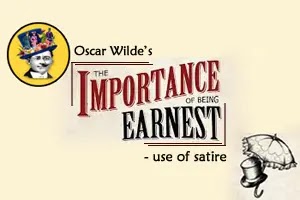The Importance of Being Earnest: Oscar Wilde’s use of satire
Q. How does Oscar Wilde use satire to criticize the societal norms and values of his time in the play?
Answer: "The Importance of Being Earnest" is a celebrated comedy play written by Oscar Wilde. First performed in 1895, it is considered one of Wilde's most famous works and a pinnacle of Victorian-era comedy. The play explores themes of identity, social expectations, and the hypocrisy of the upper class.
One of the central themes in "The Importance of Being Earnest" is the idea of dual identities and mistaken identities. The main characters, Jack Worthing and Algernon Moncrieff, both assume false identities to escape their social obligations and pursue their personal desires. This leads to a series of comedic misunderstandings and confusion.
Oscar Wilde employs satire in "The Importance of Being Earnest" to highlight and critique the societal norms and values prevalent during the Victorian era. While going through the comedy play, the readers will find how Wilde uses satire in the play:
Hypocrisy of the Upper Class: Wilde satirizes the hypocrisy of the upper class by portraying characters who adhere strictly to social conventions and manners while simultaneously disregarding moral values. For example, Lady Bracknell embodies the rigid standards of Victorian society, emphasizing the importance of lineage and wealth in marriage rather than genuine love or compatibility.
Superficiality and Materialism: The play mocks the obsession with material wealth and social status. Characters like Algernon and Gwendolen are preoccupied with appearances and trivial matters, such as cucumber sandwiches and the latest fashions. Wilde uses this satire to criticize the superficiality and lack of substance in the lives of the upper class.
Social Expectations and Double Lives: Wilde critiques the strict social expectations and double standards imposed on individuals. The characters in the play assume false identities and lead double lives to escape societal constraints. By doing so, Wilde exposes the absurdity and artificiality of these expectations.
Role of Women: Wilde challenges the traditional gender roles of his time through the portrayal of strong, intelligent, and independent female characters. Gwendolen and Cecily are proactive in pursuing their desires and challenge the authority of the male characters. Wilde uses satire to highlight the limitations placed on women and the hypocrisy of a society that restricts their freedom.
Language and Paradoxes: Wilde's use of witty dialogue and paradoxical statements serves as a form of satire. His characters engage in clever wordplay, puns, and ironic statements, exposing the artificiality and pretentiousness of Victorian society. The humor and wit in the dialogue serve as a vehicle for Wilde's social criticism.
The play, "The Importance of Being Earnest" thus satirizes the societal conventions and expectations of the time, particularly those of the upper class. Wilde uses wit and humor to expose the hypocrisy and superficiality of the Victorian aristocracy. The characters in the play are obsessed with trivial matters such as social status, wealth, and appearance, while disregarding genuine emotions and moral values.
*****
Read also:
👉 Great Expectations | Characters inhabiting the Underworld
👉 Great Expectations | the notion of gentleman
👉 Sterne’s Tristram Shandy | An Anti-Bildungsroman
👉 The School for Scandal | as an eighteenth-century comedy of manners
👉 Andrea del Sarto | as a Dramatic monologue
👉 The King of the Golden River| John Ruskin’s portrayal of Nature
👉 Preface to the Lyrical Balads | as a manifesto of Romantic Criticism
👉 Moll Flanders | as a Realistic Novel




.webp)
.webp)












0 Comments
I'm pleased to hear from you. Without any hesitation, kindly leave your valuable words in the Comment Box